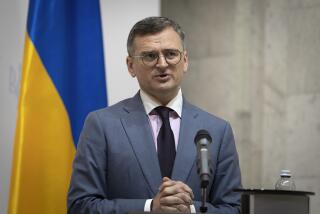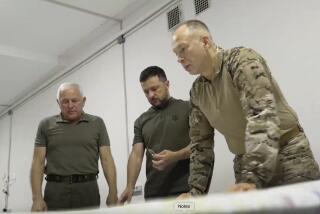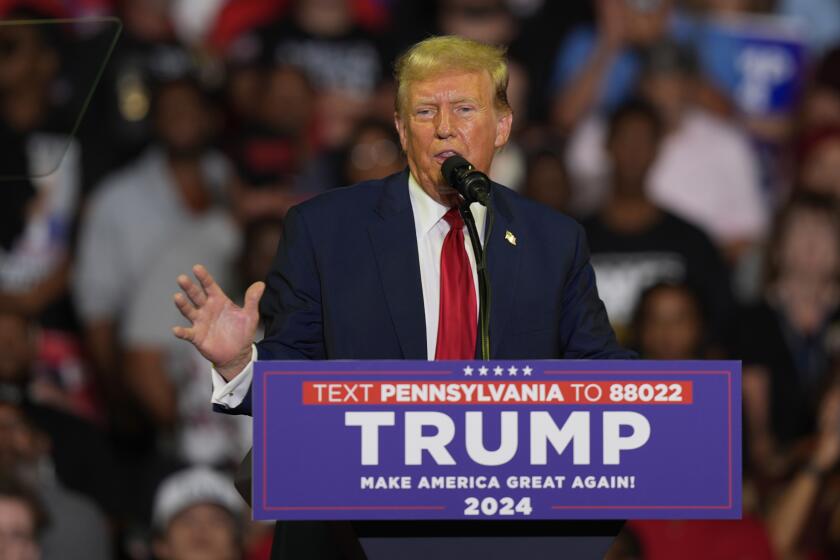Once a president, then a governor, now an illegal border crosser — what happened to Mikheil Saakashvili?
No longer welcome in his native Georgia, which has stripped him of citizenship, former President Mikheil Saakashvili vowed Monday to remain in his adopted homeland of Ukraine and fight its “oligarchic” political elite.
“I have a clear plan: to end theft from the economy, to end the power of the oligarchy, to end misuse of power,” Saakashvili told a crowd of supporters in the western Ukrainian city of Lviv.
His rousing speech came a day after Saakashvili, 49, forced his way across the border from Poland to Ukraine in a surreal scene in which dozens of the populist politician’s supporters broke through a line of Ukrainian border guards who had linked arms to block his entry. In the chaos, the crowd managed to scuttle Saakashvili across the border.
Ukrainian President Petro Poroshenko said Saakashvili — who is stateless, having lost citizenship in both Georgia and Ukraine — had crossed illegally. He equated the move with “fighters in the east” crossing the border, a reference to the Russia-backed separatist rebels whom Ukraine has been battling for three years in the country’s eastern flank.
“This is a question of the national security of the state,” Poroshenko said Monday. “It is all the same to me who breaches the state border, whether fighters in the east or politicians in the west. There should be precise, legal, judicial responsibility.”
Saakashvili’s dramatic reentry in Ukraine highlights the internal power struggles of the post-Soviet republic, which continue to hamstring reform in the country nearly four years after the start of the popular street uprising that came to be known as Maidan. The mass demonstrations ousted a Kremlin-friendly president, Viktor Yanukovich, whom protesters accused of mass corruption and nepotism. The street protests were followed by Russia’s annexation of Crimea and the conflict in the east with the Kremlin-backed separatists.
Poroshenko appointed Saakashvili, a university classmate and close friend, as the governor of Ukraine’s notoriously corrupt port city of Odessa in May 2015, less than two years after the end of Saakashvili’s second term as Georgia’s president. He served for six months before resigning, accusing Poroshenko’s administration of blocking him from doing what he had come to Odessa to do: root out corruption. In the ensuing months, Saakashvili became increasingly critical of Poroshenko, who will face reelection in 2019.
In July, Saakashvili was in the United States when he learned that his Ukrainian citizenship had been revoked, a move he said was orchestrated by Poroshenko as a way to eliminate the Ukrainian president’s political competition. Ukrainian authorities said Saakashvili had lost his citizenship because he had left out information on his residency forms regarding pending charges against him in Georgia, where he is wanted on charges of abuse of power.
Saakashvili, who led Georgia in the 2003 bloodless Rose Revolution, served as president for nearly a decade before being voted out of office.
Georgia, which does not allow dual citizenship, had already revoked his citizenship after Saakashvili took a Ukrainian passport. With claims to neither Ukraine nor Georgia, Saakashvili became stateless.
“None of this looks good for Ukraine,” said Balazs Jarabik, a nonresident scholar at the Carnegie Endowment for International Peace. “What Ukraine doesn’t need is another internal conflict.”
Poroshenko’s ratings ahead of the next election were about 11% in the most recent poll. Saakashvili’s ratings in Ukraine hovered around 2%, hardly a threat to Poroshenko at the time, Jarabik said.
By stripping Saakashvili’s citizenship, it appeared that Poroshenko was trying to eliminate his potential opponents, which “isn’t quite on the level of Yanukovich, but not that far away,” Jarabik said.
“Now, Saakashvili will become a tool of the opposition as a victim of Poroshenko’s arbitrary use of power.”
The question now remains how the West, which has thrown its support — and money — behind Kiev’s promises of economic and political reforms, will react to yet another stumble in Ukraine’s reform progress.
After losing his citizenship, Saakashvili vowed to return to Ukraine. On Sunday, he made several chaotic attempts to do so.
Saakashvili first tried to cross the border on a train from Poland, but it was stopped at the border for hours until Saakashvili agreed to get off. He then got on a bus, which was packed with journalists and Ukrainian parliamentary deputies, including Yulia Tymoshenko, whose thick, blond braids have become a symbol of her firebrand populism.
Again, border guards refused to let Saakashvili cross. At that point, a crowd of supporters rushed behind the linked border guards and tried to break through. Saakashvili was pushed through the crowd to loud cheers. Hours later, he showed up in central Lviv, where he addressed reporters.
On Monday, he said he would rally his supporters across the country.
“I intend to travel around all the regions of Ukraine, to unite as much as possible with people and with different political forces around a shared theme — that we should have democracy and not the diktat of oligarchs,” he said.
Critics accused Saakashvili of using the moment to revitalize his political career, a claim he denied.
“This wasn’t about me,” he said in a YouTube video posted Monday. It was about the hundreds who came out to support him at the border, he said.
“They felt that if I could be treated like this, anyone else could be treated like this. That’s how I see it.”
ALSO
Germany’s Merkel admonishes other European nations for not accepting more refugees
Ukraine’s separatists propose a new country: Little Russia. Kremlin denies any involvement
Ayres is a special correspondent.
More to Read
Sign up for Essential California
The most important California stories and recommendations in your inbox every morning.
You may occasionally receive promotional content from the Los Angeles Times.











